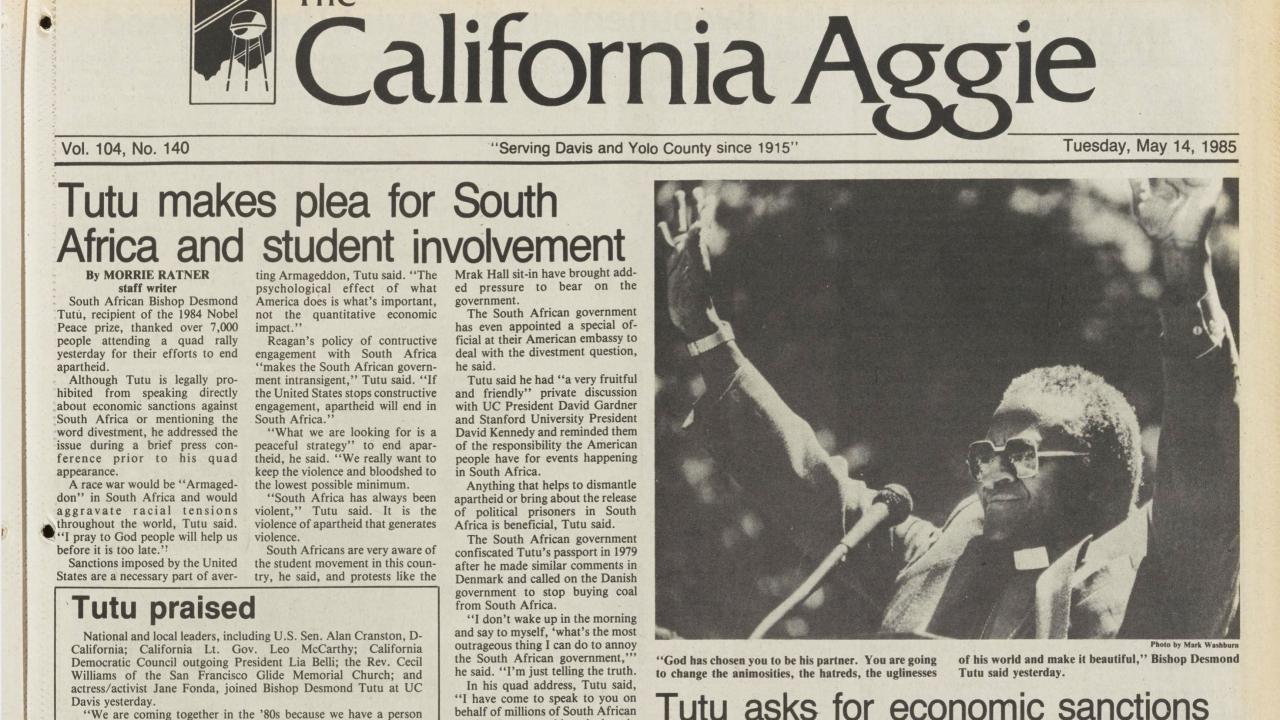
Desmond Tutu's 1985 Visit to UC Davis - Human Rights and Optimism
Tutu's passing asks us to recall his roll in ending Apartheid
Quick Summary
- Desmond Tutu stands out as one of the most influential human rights leaders of the 20th Century. His 1985 visit to US college campuses influenced a generation of human rights professionals and advocates
It is with great sadness, and condolences to the people of South Africa, that the UC Davis Human RIghts Studies Program marks the passing of human rights hero and leader of the anti-Apartheid movement, Archbishop Desmond Tutu. Bishop Tutu’s death gives us the joyful opportunity, too, to recall his 1985 tour of US college and university campuses to build awareness of the Anti-Apartheid movement and support for economic sanctions, including divestment, against the racist South African régime.
Among those campuses was UC Davis. On an undoubtedly hot May 14, 1985, Bishop Tutu, spoke to over 7000 people on the Quad. Tutu had won the Nobel Peace prize the year before and was visiting UC Davis, UCLA, Berkeley and Stanford to tell students and administrators that economic sanctions on the US ally was critical “Please, for goodness’ sake, help us exert pressure - political pressure, diplomatic pressure…Help us bring about the tremendous new” South Africa”. The complete paper is linked below.
At the time, the Reagan administration, understanding the situation in South Africa through a Cold War lens, opposed economic sanctions against South Africa. A white-ruled South Africa, Reagan believed, was a solid ally in the global rivalry with the Soviet Union and an important source of strategic minerals and natural resources. Depriving South African Blacks of their basic human rights bases of race was an acceptable price. The African National Conference was often portrayed as pro-Soviet and anti-democratic in the perverse logic of that era. Before Tutu’s visit, US opinion favored half-measures like the euphemistic “constructive engagement” that gave cover to régime. After his visit, that opinion began to change.
When Tutu spoke, that mischaracterization of the South Africa struggle just fell away. Instead what was right was clear and Apartheid was an unambiguous crime against humanity. With joy and optimism he would tell the students, (something I was at the time) that their work mattered and would help. His words were empowering. And indeed he was right. Less than a decade later, South Africa would transition to a post-Apartheid democracy, peacefully.
Many contemporary Human Rights Studies scholars and Human Rights advocates trace their own “awakening” to the era of the Anti-Apartheid and Divestment movement. I ask my own students to recall the success of the Anti-Apartheid movement, which took almost 40 years of concerted global action and resistance in South Africa, when they lose heart in the face of the human rights struggles of their generation. Tutu came to us when few could imagine a successful and peaceful change in South Africa, and his expression of love and optimism convinced us otherwise.
Tutu would help with the transition by pioneering the role of “Truth and Reconciliation.” Often criticized as fostering impunity, Tutu understood how critical the TRC was, in spite of its shortcomings to securing the peace. The TRC offered the possibility of forgiveness, even for very terrible violations of human rights, with an act of truth-telling and expression of regret. Tutu smiled, cried and laughed alongside other commissioners as South Africans exercised the right to truth and the right to be free of the past.